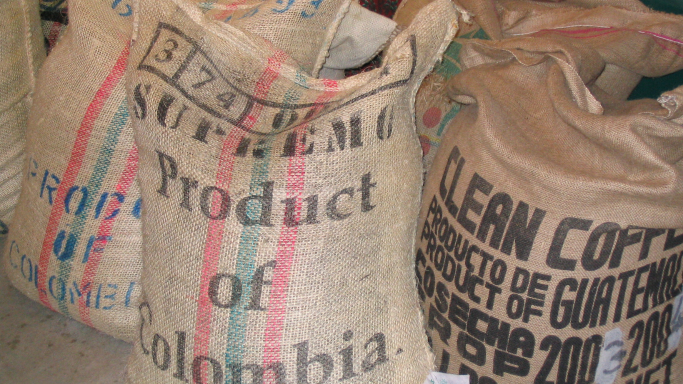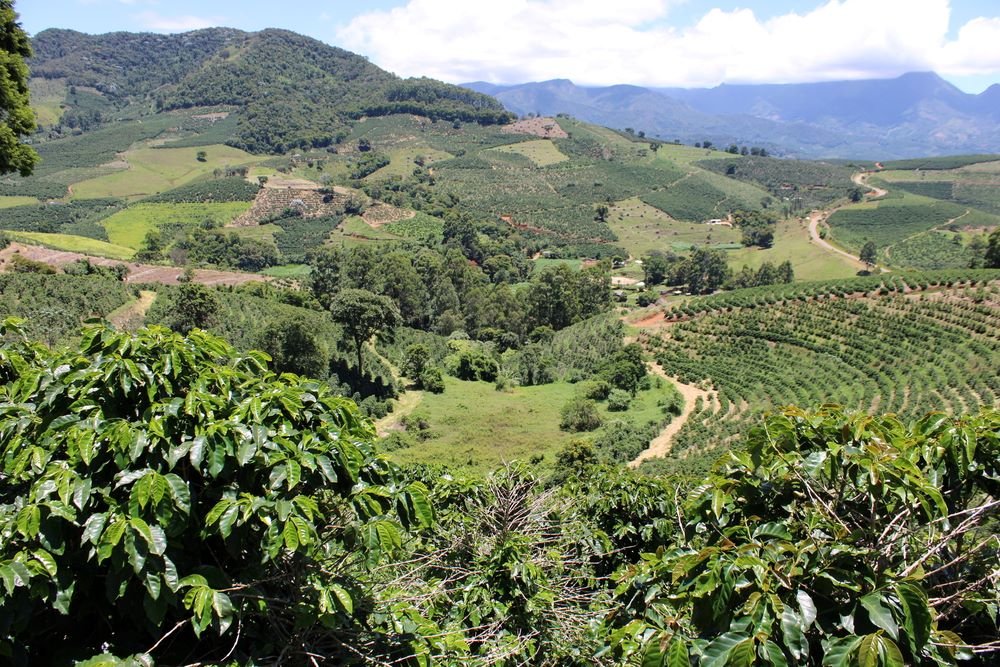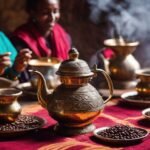Colombia is renowned worldwide for its high-quality Arabica coffee beans, which thrive in the country’s ideal climate and growing conditions. However, Colombia also cultivates other varieties like Robusta and Excelso beans across its diverse coffee-growing regions.
Our blog post will take you through a journey to discover what sets Colombian Arabica coffee apart, including its rich history, remarkable characteristics, and profound impact. We’ll also explore the niche cultivation of Robusta and Excelso beans, unravelling their unique profiles.
By sipping this blend of insights about Colombia’s diverse coffee offerings, you’ll grasp why this South American gem ranks as a global favorite for its Arabica beans while also producing smaller batches of other exquisite varieties.
Key Takeaways
- Colombian coffee is made from 100% Arabica beans, which are sweeter and have less caffeine than Robusta beans. However, some regions also cultivate small batches of Robusta and Excelso beans.
- The unique climate and geography of Colombia’s mountains provide ideal growing conditions for Arabica coffee, leading to rich flavors and high-quality beans. Robusta and Excelso beans are grown in specific microclimates.
- Coffee plays a vital role in Colombian culture, with traditional “cherry picking” methods ensuring that only the ripest Arabica cherries are selected for the best flavor.
- Colombian Arabica coffee contributes significantly to the country’s economy as a major export, providing jobs for over 600,000 producers. Smaller cultivation of Robusta and Excelso beans caters to domestic and niche foreign demand.
- Sustainable farming practices and fair trade certifications uphold ethical standards in Colombian Arabica coffee production, ensuring environmental protection. Standards for niche varieties are evolving.
- While Arabica is undisputedly Colombia’s flagship bean, the country also produces smaller batches of Robusta and Excelso for specific consumer preferences. Robusta has higher caffeine and bitterness; Excelso is intermediate in taste.
- Colombia’s coffee sector continuously experiments with different bean varieties, with the unique microclimates allowing for innovation alongside heritage Arabica coffee.
The History and Culture of Colombian Coffee

Discover the rich origins of Colombian coffee production and its deep-rooted role in the country’s tradition and daily life. Explore how this cherished beverage has become a symbol of Colombia’s cultural heritage.
Origins of Coffee Production in Colombia
Coffee plants first came to Colombia in the early 1800s. Priests brought them to plant in monasteries. The unique climate of Colombia’s mountains made it a great place for coffee to grow.
Small coffee farms started popping up all over the country.
Farmers noticed that coffee grew well on their land. They saw that their beans were really good. So, they kept growing more and selling it to other countries. Soon, Colombian coffee became famous for its quality and taste.
Coffee’s Role in Colombian Tradition and Daily Life
Colombian tradition brews with the rich aroma of coffee. Families and friends gather around cups of freshly brewed Colombian coffee, sharing stories and creating memories. Mornings in Colombia often start with a “tinto,” which is a small, strong cup of black coffee.
This simple daily ritual brings people together and sets the tone for the day. Throughout towns and cities, you’ll see vendors serving tintos from thermoses on street corners, symbolizing its role as a staple in everyday life.
In social settings, offering a cup of coffee expresses hospitality and warmth. Celebrations and business meetings alike are incomplete without it. The act of drinking coffee transcends age groups, connecting older generations who treasure their traditional methods with younger ones embracing new twists on classic flavors.
It’s this bond over coffee that strengthens community ties and upholds Colombian heritage.
Next comes an understanding of how the characteristics unique to Colombian beans contribute to these deeply rooted traditions.
Characteristics of Colombian Coffee

Colombian coffee is known for its ideal growing conditions and climate, which contribute to the high quality of the beans. Additionally, the 100% Arabica beans produce a variety of flavors and tasting notes that make Colombian coffee stand out in the industry.
Ideal Growing Conditions and Climate
Colombia’s unique setting gives life to some of the world’s best coffee. The country’s mountains reach high into the sky, providing land that is just right for growing beans. In these areas, the soil is rich and full of nutrients, giving coffee plants what they need to thrive.
Coffee trees love this kind of ground.
The weather in Colombia also helps create perfect coffee. Rain falls evenly throughout the year, making sure plants get a steady drink of water. Sunlight bathes the fields at an ideal angle due to Colombia’s position near the equator.
This combination means each bean grows up filled with flavor and quality.
100% Arabica Beans for High Quality
Colombia’s ideal growing conditions and climate provide the perfect environment for cultivating 100% Arabica beans, known globally for their exceptional quality. These beans are favored for their sweeter, smoother taste and lower caffeine content compared to Robusta beans, making them highly sought-after in the premium coffee market.
Hand-picked to ensure only the finest beans are harvested, Colombian coffee stands out for its superior flavor profile and rich aromas.
Kunjani offers meticulously sourced and expertly roasted Colombian coffee beans that encapsulate the high standard of this renowned variety.
Variety of Flavors and Tasting Notes
Colombian coffee offers a range of flavors and tasting notes, making it a delight for coffee enthusiasts. These flavors are influenced by the different regions where the coffee is grown.
- Sweet notes such as chocolate, toffee, nuts, and citrus fruits provide a delightful taste with a mild acidity.
- Variations in flavor are observed across different growing areas, leading to unique profiles.
- 100% Arabica beans result in sweeter, smoother coffee with less caffeine content.
- The wet processing method enhances the flavors, bringing out the distinctive characteristics of Colombian coffee beans.
“In addition to the 100% Arabica beans that Colombia is renowned for, some regions also cultivate small batches of Robusta and Excelso beans. Robusta beans contain almost double the caffeine compared to Arabica and have a grain-like taste profile marked by a strong, bitter flavor. Excelso is a hybrid variety with a well-balanced flavor and medium caffeine content, appealing to specific domestic consumer palates.”
The Impact of Colombian Coffee on the Economy
Colombian coffee plays a significant role in the country’s economy, serving as a major export and providing jobs and economic stability for many. Its impact extends beyond just being a popular beverage, contributing to the overall well-being of Colombia’s economy.
Major Export for Colombia
Colombian coffee stands as a major export, significantly bolstering the country’s economy. With over 600,000 producers, Colombia meticulously hand-picks each bean to uphold quality and ensure only the finest beans are harvested.
This commitment to excellence has cemented Colombian coffee as a cornerstone of the nation’s economic stability.
The impact of Colombian coffee on the economy is immense; it is one of the largest exports for Colombia. Over 600,000 dedicated producers emphasize quality by hand-picking each bean, guaranteeing only top-tier harvests.
Provides Jobs and Economic Stability
Colombia’s coffee industry is a major contributor to the country’s economy, with over 600,000 coffee producers providing employment and economic stability for numerous individuals.
The ideal climate and geography of Colombia create favorable conditions for coffee cultivation, leading to sustained jobs and financial security within the industry. As one of the world’s largest coffee producers and exporters, Colombia plays a pivotal role in its economy and trade sector through its significant contribution from the thriving coffee industry.
Traditional Coffee Production Methods in Colombia
“Cherry picking” is a traditional method of harvesting coffee in Colombia, where only the ripest cherries are carefully handpicked. The processing and roasting techniques used also play a significant role in the high-quality taste of Colombian coffee.
“Cherry picking”
In Colombian coffee production, “cherry picking” involves carefully selecting only the ripest coffee beans by hand. This meticulous process ensures that only the highest-quality beans are used, resulting in a rich and flavorful cup of Colombian coffee.
As a result, the superior taste and aroma of Colombian coffee can be attributed to this rigorous selection method.
The traditional practice of “cherry picking” plays a crucial role in maintaining the exceptional quality and reputation of Colombian coffee. By hand-selecting only the best beans, it contributes to the distinct flavor profile that sets Colombian coffee apart from others in the industry.
Processing and roasting techniques
After the meticulous “cherry picking” process, Colombian coffee beans undergo a stringent processing and roasting procedure to bring out their distinctive flavors. The beans are meticulously washed to remove impurities and then carefully dried to the optimal moisture level.
Following this, they are roasted to perfection, depending on the desired taste profile for each batch.
The roasting process brings out the unique flavor characteristics of Colombian coffee beans. Lighter roasts enhance the bean’s original flavors, while darker roasts produce bolder and richer profiles.
“While traditional “cherry picking” applies to Arabica beans, niche coffee varieties like Robusta and Excelso undergo slightly modified harvesting and processing techniques tailored to the bean.”
Identifying High-Quality Colombian Coffee
To ensure you are getting high-quality Colombian coffee, look for origin labeling to guarantee authenticity and consider the roasting techniques used for optimal flavor.

Origin Labeling to Ensure Authenticity
Origin labeling in Colombian coffee is crucial to ensure authenticity. With over 600,000 producers in Colombia, each bean is meticulously hand-picked for quality, guaranteeing its genuineness and originality.
The reputation of Colombian coffee for top-notch quality also stems from maintaining the authenticity of its origins through stringent labeling practices. This emphasis on origin labeling assures consumers that they are getting genuine Colombian coffee, produced with care and tradition.
Colombian coffee’s commitment to authentic origin labeling aligns with the assurance of high-quality Arabica beans and a meticulous production process, making it a standout choice in the world of premium coffees.
Roasting Techniques for Optimal Flavor
Colombian coffee roasting is a precise art, crucial for bringing out the unique flavors and aromas. The optimal roast temperature ranges between 410°F to 460°F for around 12 minutes, accentuating the natural sweetness and acidity of the beans.
Roasters employ techniques such as “light roast” or “medium roast” to maintain the delicate balance of Colombian coffee’s tasting notes, ensuring a perfect cup every time.
By perfecting these roasting methods, Colombian coffee achieves its renowned flavor profile. Each batch undergoes meticulous monitoring to extract the ideal taste from the Arabica beans while preserving their subtle nuances.
This sets Colombian coffee apart in delivering a consistently exquisite experience that captivates aficionados worldwide.
Health Benefits of Colombian Coffee
Colombian coffee offers numerous health benefits, such as providing antioxidants that can contribute to overall wellness and lower caffeine levels for those with sensitivities. Additionally, the unique flavor profile of Colombian coffee makes it a popular choice among coffee enthusiasts seeking a healthier alternative.
Antioxidants for Overall Health
Colombian coffee, made from 100% Arabica beans, is rich in antioxidants that promote overall health. The ideal climate and geography of Colombia make it the perfect location for coffee cultivation, resulting in high levels of antioxidants in Colombian coffee.
The country’s many coffee-growing areas produce variations in flavor with different levels of antioxidants, offering a variety to cater to different taste preferences. Colombian coffee usually boasts sweet notes such as chocolate, toffee, nuts, and citrus fruits – all sources of antioxidants.
Grown at varying altitudes between 1,100 and 2,000 meters above sea level contributes to the high antioxidant content of the beans.
Lower Caffeine Levels for Sensitivity
When considering Colombian coffee, it’s important to note that it is made from 100% Arabica beans, containing less caffeine compared to Robusta beans. This lower caffeine content makes Colombian coffee a favorable choice for individuals with sensitivity to high levels of caffeine.
As a result, Colombian coffee provides an option for those who seek the rich flavors and aromas of coffee without experiencing the jitters or other adverse effects associated with higher caffeine intake.
Why Colombian Coffee is Known for its Quality
Colombian coffee is known for its quality due to a combination of factors, including the ideal climate and growing conditions, 100% Arabica beans, and traditional processing techniques that bring out unique flavors.
Its reputation in the global coffee industry also adds to its popularity and demand.
Factors contributing to flavor profile
Factors contributing to flavor profile:
- Geographic Diversity: Colombia’s various coffee-growing regions with distinct climates and altitudes result in diverse flavor profiles, from fruity and floral to nutty and chocolatey.
- Soil Quality: The rich volcanic soil of Colombian coffee plantations enhances the beans’ natural sweetness and acidity, influencing their unique flavors.
- Harvesting Techniques: The meticulous “cherry picking” method ensures only ripe coffee cherries are selected, contributing to the beans’ optimal flavor development.
- Processing Methods: Colombian coffee’s wet processing technique preserves the beans’ intrinsic flavors, giving them a bright, clean taste with pronounced acidity.
Reputation and popularity in the coffee industry
Colombian coffee has gained a stellar reputation in the global coffee industry due to its rich and distinct taste, capturing the attention of coffee enthusiasts worldwide. The unparalleled quality and diverse flavors produced by Colombia’s various coffee-growing regions have solidified its status as a top player in the market.
With over 600,000 meticulous producers hand-picking each bean for optimal quality, Colombian coffee sets an exceptional standard coveted by consumers and industry professionals alike.
This widespread acclaim can be attributed to Colombian coffee’s exclusive use of 100% Arabica beans, renowned for their sweetness, smoothness, and lower caffeine content – appealing qualities that continue to elevate its popularity among discerning coffee lovers globally.
Differences between Colombian Coffee and Other Varieties
Colombian coffee is known for its high-quality Arabica beans, which differ from the Robusta beans found in other varieties. Colombian coffee also boasts a unique flavor profile that sets it apart from other coffee varieties around the world.
Arabica vs. Robusta Beans
Colombian coffee is exclusively made from 100% Arabica beans, which are known for their smoother, sweeter flavor and lower caffeine content compared to Robusta beans. The unique qualities of Colombian coffee are a direct result of the exclusive use of Arabica beans rather than Robusta.
This distinction gives Colombian coffee its distinct taste and aroma, setting it apart from other varieties. The use of 100% Arabica beans ensures that Colombian coffee maintains a rich and superior flavor profile that has earned it a reputation for exceptional quality in the global market.
Arabica vs. Robusta Beans:.
1. Exclusive use of 100% Arabica beans sets Colombian coffee apart.
2. Arabica beans contribute to Colombian coffee’s richer and distinct flavor profile.
Unique Flavor Profiles of Colombian Coffee
Colombian coffee, grown from 100% Arabica beans in optimal altitude and climate, offers a diverse range of flavor profiles. With tasting notes ranging from citrus and floral to nutty and chocolatey, Colombian coffee provides a unique sensory experience.
The distinct flavors are a result of the meticulous hand-picking process combined with the region’s fertile soil, creating a robust yet balanced taste that sets Colombian coffee apart in the global market.
The unique flavor profiles of Colombian coffee stem from its cultivation at high altitudes and ideal climate conditions. This combination produces 100% Arabica beans with complex tasting notes ranging from fruity to nutty, delivering an unparalleled coffee drinking experience.
Sustainable Practices in Colombian Coffee Production
Colombian coffee farmers prioritize sustainable farming practices to protect the environment and ensure the longevity of their industry. Through fair trade certifications and environmentally friendly farming methods, Colombian coffee production is committed to ethical and sustainable standards.
Fair Trade Certifications for Ethical Standards
Fair trade certifications guarantee ethical standards in Colombian coffee production. These certifications ensure that coffee producers receive fair payment for their beans, promoting social and economic sustainability within the industry.
Not only do fair trade certifications support the livelihoods of coffee producers, but they also uphold environmental standards during the production process, minimizing the impact on the ecosystem.
Through these ethical and sustainable practices enforced by fair trade certifications, Colombian coffee maintains its distinct qualities and enhances its overall quality and reputation in the global market.
Environmentally Friendly Farming Methods
Colombian coffee farmers prioritize environmentally friendly farming methods to sustain the land and protect natural resources. By implementing organic composting, they enrich the soil without harmful chemical fertilizers, promoting long-term soil health and fertility.
Additionally, they utilize shade-grown techniques, preserving biodiversity and reducing deforestation while also minimizing water usage by employing drip irrigation systems that ensure efficient water distribution.
Implementing sustainable coffee farming practices not only safeguards the environment but also benefits local communities by creating a healthy ecosystem for wildlife and reducing pollution from agricultural chemicals.
Sustainable farming practices and ethical production standards for Arabica coffee are well-established, while certification and regulations for niche varieties like Robusta and Excelso continue to evolve.
Popular Colombian Coffee Brands
Explore the iconic Juan Valdez Cafe and its representation of quality Colombian coffee. Learn about the global impact of Cafe de Colombia as a prominent brand in the industry.
Juan Valdez Cafe as a Symbol of Quality
Juan Valdez Cafe represents the epitome of Colombian coffee, known for its exceptional quality and rich flavor. As a symbol of tradition and excellence, this brand showcases the pride and superior taste associated with Colombian coffee.
Its commitment to using only the finest Colombian coffee beans ensures that every sip delivers an authentic experience, upholding the reputation of Colombian coffee on a global scale.
This dedication makes Juan Valdez Cafe a standard-bearer in the industry, serving as a source of pride for Colombian coffee farmers while offering top-notch coffees that captivate palates worldwide.
Cafe de Colombia: A Global Brand
Cafe de Colombia stands as a symbol of quality and excellence in the world of coffee. This global brand is synonymous with the rich and distinct taste that Colombian coffee offers, thanks to its 100% Arabica beans.
With over 600,000 dedicated coffee producers hand-picking each bean for top-notch quality, Cafe de Colombia has cemented itself as a leading force in the global coffee market. Its reputation precedes it, making it an integral part of Colombian coffee culture and heritage.
Fueled by a commitment to excellence and tradition, Cafe de Colombia continues to captivate consumers worldwide with its unique flavor profile and unwavering dedication to high-quality production standards.
The Future of Colombian Coffee
As the Colombian coffee industry continues to grow, it faces challenges such as climate change and competition in the global market. However, ongoing innovation and sustainability efforts aim to ensure a prosperous future for Colombian coffee production.
Challenges Faced by the Industry
Colombian coffee production faces challenges in accessibility and transportation due to mountainous terrains, hindering the movement of goods and equipment. This presents difficulties in maintaining consistent quality across diverse coffee-growing regions, impacting coordination and quality control.
The large number of coffee producers further intensifies market competition, posing additional challenges for the industry.
The labor-intensive hand-picked harvesting process is time-consuming and may lead to potential issues with labor availability and cost. Meeting global demand while upholding a reputation for top-notch quality amidst competition from other coffee-producing countries is also challenging.
Innovation and Sustainability for Growth
Facing the challenges prevalent in the industry, Colombian coffee producers are focusing on innovation and sustainability for growth. With over 600,000 coffee producers in Colombia, there is a significant push to adopt environmentally friendly farming methods.
These efforts aim to ensure that coffee cultivation not only meets the demands of today’s market but also remains sustainable for future generations.
Innovation plays a crucial role as well, with ongoing research into refining cultivation techniques and processing methods. This focus not only contributes to maintaining high-quality production but also ensures that Colombian coffee stays competitive in the global market.
Conclusion
In conclusion, Colombian coffee stands out for its rich taste and unique qualities. The ideal climate and geography of Colombia provide the perfect conditions for cultivating high-quality coffee beans.
With over 600,000 producers ensuring that only the best beans are hand-picked, Colombian coffee has gained a well-deserved reputation for excellence. Embrace the gratifying and stimulating experience offered by Colombian coffee to elevate your daily coffee ritual! Experience the exceptional flavors and be part of the legacy of Colombian coffee.
FAQs
1. Why is Colombian coffee so popular?
Colombian coffee is popular because of its high quality, special flavor profile, and the rich farming heritage that results in a unique taste that people love.
2. How do farmers in Colombia grow their coffee beans?
Coffee farmers in Colombia use traditional methods to cultivate Arabica beans, including cherry picking by hand and sustainable agriculture practices on their plantations.
3. What makes the flavor of Colombian coffee different from others?
The Colombian climate along with careful coffee processing methods give Colombian coffee its distinct flavors with hints of fruitiness and nuttiness, making it stand out.
4. Is all Colombian coffee made using fair trade practices?
Many Colombian coffee varieties are now part of the fair trade movement which supports better prices and working conditions for farmers, although not all beans carry this certification.
5. Does Juan Valdez represent real Colombian Coffee?
Yes! Juan Valdez is a symbol created to represent authentic Café de Colombia brand which showcases the premium nature of true Colombian Coffee.
6. Are there environmental benefits to choosing Colombian coffee?
Choosing environmentally friendly or sustainably certified Columbian coffees helps support eco-friendly farming techniques crucial for reducing environmental impact while enjoying your brew.






